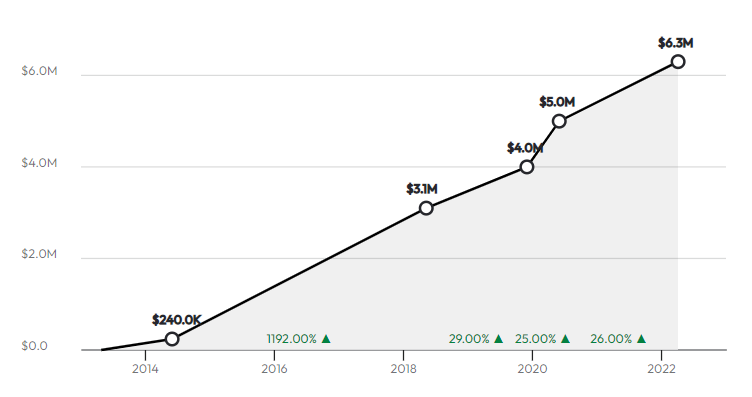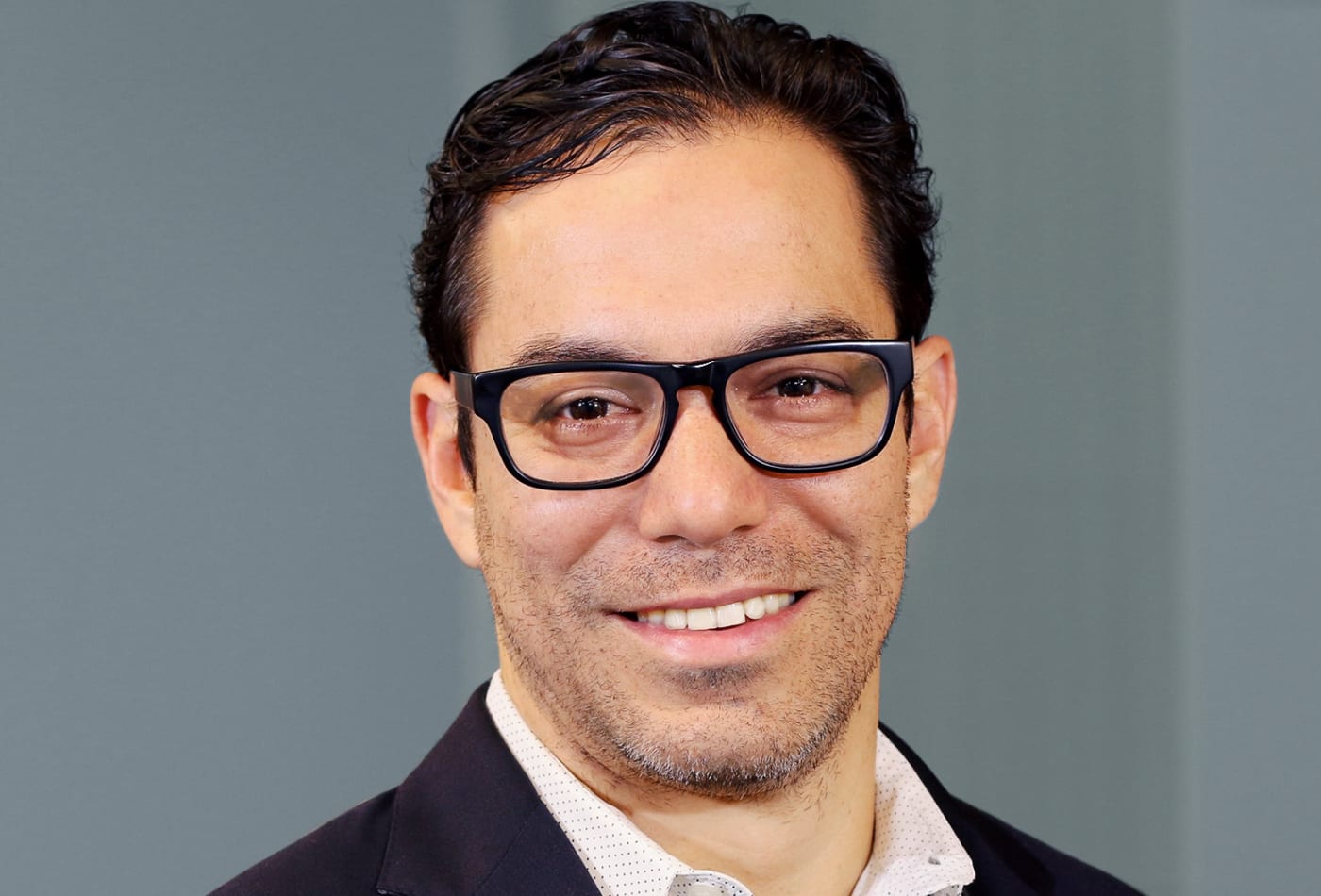As SaaS Pingboard closes in on its tenth anniversary, co-founder and CEO Bill Boebel made the hard decision to step down as CEO to help scale the SaaS organization chart tool’s business. Boebel and newly appointed CEO Laith Dahiyat recently sat down with the Latka team to discuss what drove Boebel to make this choice, how he found his replacement Dahiyat, and what the two of them expect next from Pingboard.
Bill Boebel Co-founded Pingboard in 2013 with Robert Eanes, CTO. The company grew from a $240,000 run rate in 2014 to $5m in 2020. That’s when CEO Boebel recognized that he was starting to struggle as the team grew to 40. Instead of letting his ego get in the way, Boebel spoke to his board and decided to make a change together, bringing Laith Dahiyat, former GM of Weedmaps, in as the new CEO after an 11-month search.
- Team of 40 dropped to 25 during COVID
- 2,500 customers, 2X from 2018
- $7.5m raised to date, all Seed Rounds
CEO Realization in 2020 as Team Grows to 40
CEO Boebel realized that managing a small staff of 25 was his sweet spot. As his team grew to 40 in 2020, doing $5m in revenue pre-COVID, Boebel sensed that he was out of his element. He began to doubt his ability to scale Pingboard to the next level.
COVID Hits, Cutbacks to a Team of 25 Delay Plans
The global pandemic delayed Boebel’s plans to explore his replacement. Instead, he faced the challenge of scaling back his team. During this time, the Pingboard staff was cut to 25, and Boebel again managed to run the organization comfortably. However, as soon as the world began to open up again, Pinboard’s growth began clicking, and they again were “hiring like crazy.”
Support From Board in 2021
Once growth accelerated again for Pingboard, Boebel talked to the board about how to proceed. He explained that they asked him good, tough questions, including “do you want to be CEO in this phase?” Boebel said he thought about it for 30 seconds, then answered “no.” From there, the search was on to find the right CEO to scale Pingboard to the next level.
11-Month Search and Hire
Boebel explained that they hired an executive search firm, Caldwell, to help conduct the search, which lasted 11 months. Caldwell charged a standard 30% of the year-one salary for their services. Boebel quipped that half of that time was taken to decide on what the ideal profile of that right person would look like.
Caldwell Guided the Scorecard Process for a Product Expert
Boebel explained that although Caldwell had a scorecard process, he and the board had specific priorities for their ideal candidate. Pingboard needed a CEO who already had expertise with product and product-led growth. Boebel noted, “it takes a special person to understand the mechanics of how to engineer a well-oiled self-serve machine,” reiterating that, “We still don’t have a sales team today.”
Initial Meetings Quickly Accelerated to Future Strategy
Boebel first met Laith Dahiyat in January 2022. The Co-Founder and Weedmaps GM had overlapping connections in Austin and San Antonio but had never directly met. Boebel explained that “after the first meeting or two, Laith was different from the other candidates. We talked strategy quickly. Dahiyat added, “We started asking each other what is Pingboard, what it wants to be, and how it needs to evolve?”
Dahiyat: Super Intense, Dashboards Guy
Latka connected with Chargify’s Marcus Nicholson and asked him to describe Dahiyat. According to Nicholson, “Laith is a super-intense dashboards guy.”. Dahiyat chuckled at the description, explaining that he does use metrics to drive accountability and growth. Dahiyat explained that he and Nicholson launched Chargify together and that, yes, he is easily excitable about business, adding, “I love wins, and I love collaboration.”
Targeting 40% YOY Growth in the Next 12 Months
New CEO Dahiyat bluntly noted, “I am here to accelerate growth. It’s current at 26% YOY at $6.3m. I am targeting 40%+ growth in the next 12 months.” Latka quickly noted that to make most VCs happy, growth should be much higher than 40%, at which point Dahiyat stated that his target was purposefully conservative and has not yet been fully vetted by the board.
50-500 Employees as the Sweet Spot
Pingboard now realizes that their sweet spot is upper SMB/ lower mid-market companies with 50-500 team members. “A company has to have grown enough to realize they need the tool, and once they’re over 500 members they will be using an enterprise tool,” explained Dahiyat.
40% Growth in the Base
According to Boebel, there’s 40% growth potential in the base of 2,500 customers through upsells. “We’ve already had some success with the support-level model,” adding that the “Pingboard demo drives adoption and then assisted base.” Dahiyat added that although the new customer ARPU is $150, they closed a $1,200/month deal on April Fool’s Day. “It was no joke,” he quipped.
Scaling $6m B2B SaaS companies to $20m
According to Dahiyat, as GM at Weedmaps, he oversaw the entire B2B SaaS division at a $240m company. His roots and expertise before Weedmaps was scaling $6m+ B2B SaaS companies to $20m. He chose to join Pingboard because of its strong Board of Directors.
Series A in 12 months?
Dahiyat explained that Pingboard focuses on methodical growth instead of closing $50-100m in funding to “burn and grow.” Boebel and Dahiyat indicated an openness to exploring a Series A round a year or so. Meanwhile, Dahiyat plans to “under-promise and over-deliver.”
Continuing Touch Zero Operating Plan
Latka asked Boebel to restate his “Touch Zero Operating Plan”. From the beginning, Boebel wanted to get profitable with each round of funding before moving on to another funding round. He added that if you have a certain amount of cash, you need to invest it. He believes the best way to optimize a business is to invest all, and touch zero in the bank. “Its easy to raise money if you are doing well,” he added.
Engagement and Retention for Remote Teams
Pingboard is well situated to capitalize on the growth of remote teams as they hone their focus to keeping employees engaged and happy, as employers look for advantages to increase retention. “We don’t have the story told well yet,” noted Dahiyat. Pingboard is adding features like networking, recognition, and Slack integration in an attempt to attract People Ops teams. To increase retention, and engagement, “today’s employees want continuous feedback, 1:1 meetings, and other tools to see who’s doing well in real-time,” Dahiyat explained.
VC Series A vs. Buyout?
Lakta observed that Pingboard could make an ideal acquisition for massive companies like Vista Equity, K1 and others, and asked Dahiyat how he would balance a VC Series A funding deal vs. a buyout offer. Dahiyat exclusively replied that they believe Pingboard has lots of runway and opportunity for growth.
3 Seed Rounds Total $7.5m
So far Pingboard has raised a total of $7.5m over three seed rounds, with 40 angel investors. Latka noted that Pingboard is very capital-efficient with a high revenue per employee. He applauds Boebel for taking a step back, to which Boebel responded, “A lot more founders should replace themselves, Nathan.”
Fast Five with Laith Dahiyat
New Pingboard CEO Laith Dahiyat’s favorite current book is Good to Great by Jim Collins. Laith’s favorite tool to help build business is Google Sheets. As a father of 2 children under 2, he sleeps an average of 6 hours per night, but “only in two-hour blocks.” He is 47 and married. He wishes at 20 he had known and understood the importance of mentors, and building relationships as a young professional.











